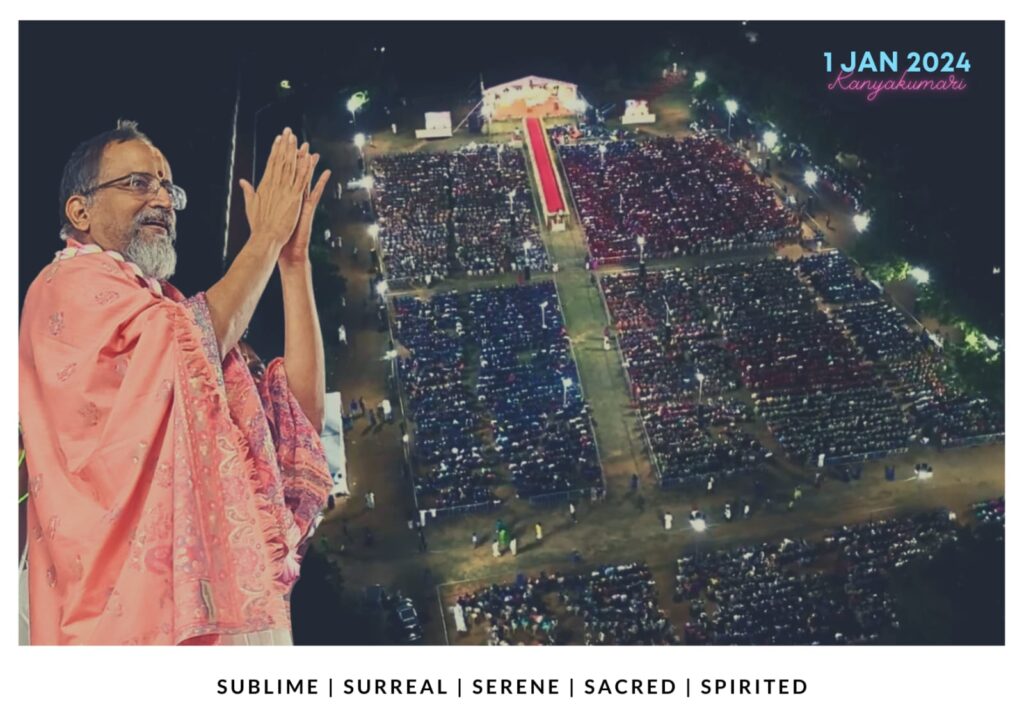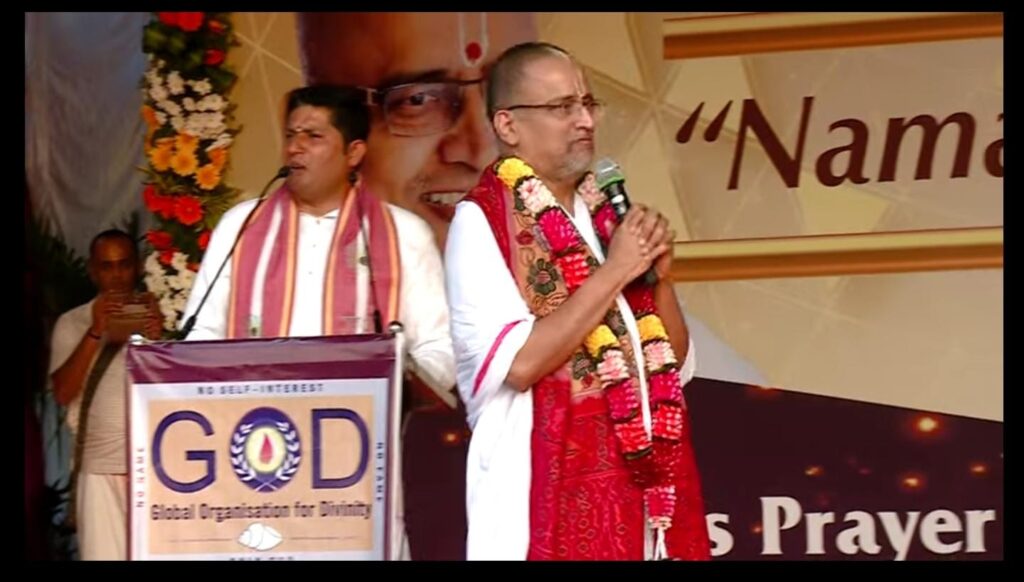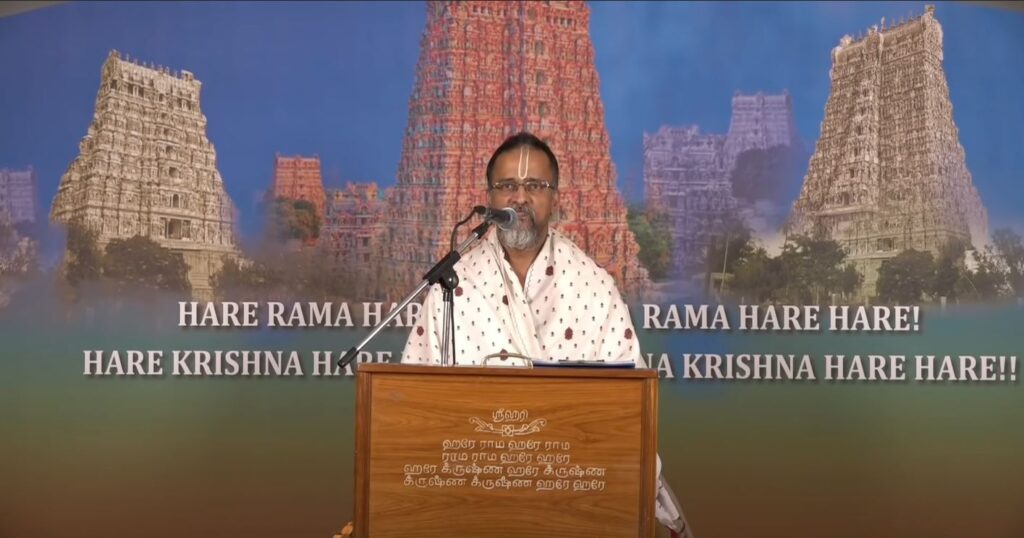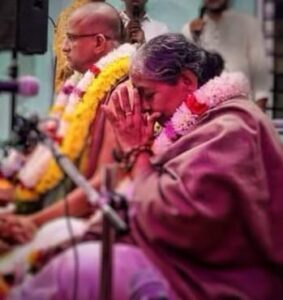Sri Swamiji’s Kalpataru Day Mass Prayer – Jan 1 2024

On January 1st, 1886, Sri Ramakrishna bestowed blessings on his devotees like a wish-fulfilling tree. This day has since been celebrated as Kalpataru Day by the Ramakrishna Mission. Additionally, the concept of mass prayer was made familiar through Mahatma Gandhi’s sessions chanting Rama Nama throughout his lifetime. Similarly, our own Guru Maharaj, HH Maharanyam Sri Sri Muralidhara Swamiji, has continued to conduct Mahamantra mass prayers on the auspicious Kalpataru Day, in different cities for many years. This year, the 18th Kalpataru Day Mass Prayer was held in Kanyakumari at the Vivekananda Kendra. Below are the excerpts from Sri Swamiji’s talk.
“In this town, at the confluence of three seas, a fourth ocean emerges, brought forth by the assembly of over 10,000 bhagavatas. Gazing upon you all, I feel energized and filled with inspiration,” Sri Swamiji expressed with jubilation.
Reflecting on why Sri Kanyakumari Devi holds a japa mala, Sri Swamiji explained that japa represents the sole path to salvation in this yuga, as our scriptures declare. This sacred practice isn’t exclusive to Kanyakumari Amman at India’s southernmost point; even Sri Badri Narayanan in the Himalayas wears the japa mala. These divine siblings, Sri Narayana and Sri Durga, guard Bharat from the north and south. When we look at Nardhana Ganapathy in a Shiva temple, Lord Muruga in Tiruchendur, and Saraswati Devi, the Goddess of Knowledge, they all hold the japa mala. The unified gestures of these deities signifies the universal call for Nama Japa as the ordained route to liberation in this Age.
The Supremacy of Bhagavan Nama
As we know, Hanumanji commenced his journey from Kanyakumari to Sri Lanka. Sri Ramakrishna Paramahamsa, in his teachings, stated, “Rama had to build a bridge to traverse the ocean, whereas Hanuman crossed it effortlessly through the sky by merely chanting Rama Nama. Thus, Bhagavan Nama is more powerful than Bhagavan Himself.”
Bhagavan Nama has existed since time immemorial, predating all scriptures and religious texts. It has been inextricably linked with Bhagavan since His very existence. The earliest and most revered form of worship was the chanting of Bhagavan Nama, underscoring its supreme significance among all modes of worship.
The simplest method to forge a connection with the Almighty is through continuous chanting of His names, effortlessly guiding us across the vast ocean of samsAra. Upon reaching Sri Lanka, Hanumanji first narrated the Ramayana to Mother Sita, making him the inaugural figure to deliver Bhagavad katha in foreign lands, preceding any other sadhus and rishis who traveled abroad.
The Simplicity and Strength of Nama Japa
In this mass prayer, Sri Swamiji advocated for the simple and accessible practice of Nama Japa, emphasizing its cost-free nature and the absence of any potential for error. He noted that this practice requires no external teaching or support, and is not bound by any rules whatsoever, allowing anyone to chant Bhagavan Nama anytime, anywhere.
The path of Nama sankirtan, as celebrated by devotees across various sects, was notably championed by Appar (Thirunavukkarasar). Enduring severe torture by a king for his conversion to Saivism, Appar’s unwavering devotion was evident in his persistent invocation of the Lord, ‘Namah Shivaya’. This act of supreme faith highlights the indistinguishable nature of Nama and Bhagavan. This unity is also reflected in the ancient text, Thiruvasagam, which begins with the invocation of Lord Shiva as ‘Namah Shivaya’.
Echoing this reverence, Vallimalai Swamigal extols the ‘Muruga’ Nama in his works, Kandar Anubhuti and Kandar Alankaram. Likewise, Sri Andal, in Tiruppavai, repeatedly urges the chanting of Bhagavan’s names. Similarly, Bhagavan Ramana’s Akshara Manamaalai celebrates the name ‘Arunachala’, while Sage Agastya, in Lalitha Navarathna Maalai, glorifies ‘Devi’ Nama, and states that Her divine grace is not bestowed upon those who do not chant it.
Devotees of any deity, be it Devi, Muruga, Ganesha, Shiva, or Narayana, unanimously extol the power of Bhagavan Nama. Despite this, many overlook the practice of chanting due to its simplicity and their lack of faith. There’s a common misconception that effectiveness must come from complexity or difficulty. This is akin to the idea that a daily laborer toiling physically might earn less than someone who effortlessly facilitates a transaction, demonstrating that effort and reward are not always directly correlated.
The Power of Mahamantra
Sri Swamiji emphasized the importance of recognizing and following the simplest and most appropriate spiritual path for our times as guided by Mahans, which is chanting of the Mahamantra:
“Hare Rama Hare Rama Rama Rama Hare Hare
Hare Krishna Hare Krishna Krishna Krishna Hare Hare”
This mantra holds the key to fulfilling essential life needs, achieving our goals without hindrance, and attaining fame, wealth, victory, and ultimately, liberation. The regular chanting of this Mahamantra is a powerful means to achieve these aspirations. The Mahamantra is like a wish-fulfilling tree or like a Kamadhenu. This was exemplified by Yogi Ramsuratkumar in Tiruvannamalai, who devotedly chanted Rama Nama day and night, every day of the year. Those who sought his blessings found resolution to their problems, not through specific deity pujas, but through the power he harnessed from his unwavering dedication to chanting Rama Nama. He consistently maintained, “This beggar possesses no power for miracles. It is only Ram Naam that works such wonders.” Such statements underscore the potency of Bhagavan Nama.
Importance of Faith in Nama
Sri Swamiji’s advice was clear: “Stay focused and chant as much Nama as possible with faith, without letting your mind wander. Not a single Nama chanted will go in vain; each one will come to your aid when most needed. Nama will never let you down. You need unshaken faith that Nama will protect you.” We should learn to seek assistance directly from Bhagavan by chanting His Name, rather than relying on others. Worrying or lamenting serves no purpose.
To reinforce our faith in Nama, Sri Swamiji advised: “Devote yourself to chanting Nama as much as you can, day and night. Then, the doors of victory will open to you. Those who embrace Nama chanting will be spared from defeat, fear, and sickness.” He pointed out that without this practice, we often find ourselves consumed by worry, regret, and idle talk, which are ultimately fruitless. Embracing this straightforward path demands our utmost focus and dedication.
Sri Swamiji’s Blessing Message
Each nation may be led by a President or Prime Minister, but the entire world is ruled by none other than Bhagavan. Unlike human governance, where errors can occur, Bhagavan’s rule is flawless and perfect. Everything happening in the world is necessary and correct. Bhagavan, being perfection personified, cannot produce imperfection. Faithful chanting of Bhagavan Nama will bring prosperity to not only us, but our city, country, and the world at large. Chanting nama is the simplest path to progress and prosperity.
In his concluding words, Sri Swamiji blessed, “Let this new year 2024, bring good news and auspicious events for all of you. Let there be no disappointments, only victories in your life, and may there be no defeat. In the name of Bhagavan, I bless you all with a healthy life.”
Translated and excerpted by Raman Veezhinathan, Richmond VA
Click here to go back to the February 2024 newsletter page:
https://godivinity.org/newsletters/nama-dwaar-newsletter-february-2024/






